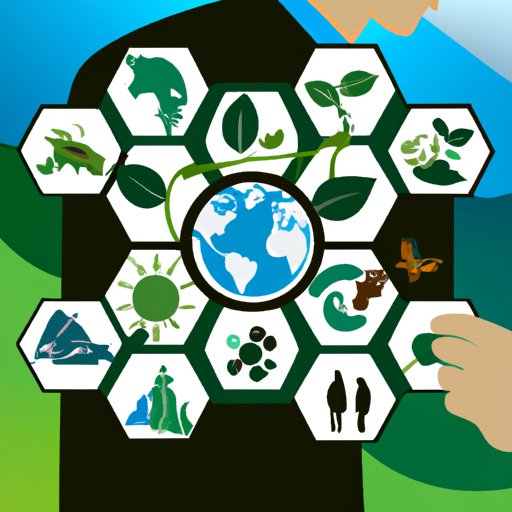Introduction
Environmental science is a broad field that encompasses a range of disciplines from ecology to chemistry. An environmental science degree provides a comprehensive understanding of the natural world and the complex ways in which humans interact with it. With a degree in environmental science, students can pursue a variety of careers, from working in conservation to developing green technologies.
This article will explore what you can do with an environmental science degree. We’ll look at some of the most popular career paths and discuss the skills, education, and certifications required for each. We’ll also examine the job opportunities available in each field.
Working in Environmental Conservation
Environmental conservation is an important part of preserving the planet’s natural resources and habitats. Individuals with an environmental science degree can work in conservation in a variety of roles, including park rangers, wildlife biologists, and conservation officers.
Park rangers are responsible for protecting public lands and educating visitors about the environment. Wildlife biologists study plants and animals in their natural habitats, while conservation officers are responsible for enforcing environmental laws and regulations. All three roles require a deep understanding of the natural world and a commitment to protecting it.
In addition to a degree in environmental science, these jobs typically require certifications or licenses. Park rangers may need to obtain a certification in wilderness first aid or search and rescue, while wildlife biologists often need to become certified in wildlife management. Conservation officers may need to obtain a state-issued law enforcement license.

Researching Climate Change and Its Impacts
Climate change is one of the most pressing environmental issues of our time. Individuals with an environmental science degree can use their knowledge to research the causes and effects of climate change, develop strategies to reduce its impact, and advise governments and businesses on how to mitigate its effects.
Climate scientists need a strong background in the physical sciences, particularly meteorology, atmospheric physics, and oceanography. They must also have a good understanding of computer modeling and data analysis. In addition to an environmental science degree, many climate scientists obtain a master’s or doctorate degree in a related field.
Climate scientists typically work in research laboratories or government agencies. They may also work for private companies or non-profit organizations. Many climate scientists also teach courses at universities or conduct outreach to inform the public about the effects of climate change.
Advising on Sustainable Development Practices
Sustainable development is an important part of protecting the environment and ensuring that future generations have access to clean air, water, and resources. Individuals with an environmental science degree can play an important role in advancing sustainable development practices.
These professionals may work in the public or private sector, advising governments, businesses, and other organizations on how to reduce their environmental footprint. They must have a strong understanding of the principles of sustainability, as well as an ability to analyze data and develop policies to achieve sustainability goals.
To work in this field, individuals need an environmental science degree, as well as experience in environmental policy or law. Some positions may also require additional certifications or licenses.
Developing Green Technologies
Green technology is an emerging field that seeks to reduce humanity’s environmental impact by developing new technologies that are more efficient and less damaging to the planet. Professionals with an environmental science degree can help to advance the development of green technologies by researching new solutions and developing strategies to implement them.
Green technologists must have a deep understanding of the science behind energy production and consumption, as well as an ability to think creatively and develop innovative solutions. They must also have a good grasp of economics and policy, as they may be involved in developing strategies to encourage the adoption of green technologies.
Most green technologist positions require an advanced degree in environmental science or a related field, as well as experience in the field. Additional certifications or licenses may also be required.
Teaching Environmental Science Courses
Environmental science is an ever-evolving field, and it’s important for students to stay up to date on the latest developments. Individuals with an environmental science degree can help to educate the next generation of environmental scientists by teaching courses at universities and colleges.
These professionals need a deep understanding of the subject matter and an ability to communicate complex concepts in an engaging way. They must also have a good grasp of the current literature in the field and be able to develop course materials and assignments that challenge students and prepare them for the real world.
Most college and university positions require a master’s or doctorate degree in environmental science, as well as teaching experience. Additional certifications or licenses may also be required.
Managing Environmental Programs
Environmental programs aim to protect the planet’s natural resources and promote sustainability. Individuals with an environmental science degree can help to manage these programs by developing strategies, coordinating activities, and monitoring progress.
Program managers need a deep understanding of environmental issues, as well as an ability to manage resources and personnel. They must also have a good understanding of environmental policy and law, as they may be involved in developing regulations or advocating for legislation.
Most program manager positions require a master’s degree in environmental science or a related field, as well as experience in the field. Additional certifications or licenses may also be required.
Consulting for Businesses on Eco-Friendly Practices
As businesses become increasingly aware of the need to reduce their environmental impact, they are turning to professionals with an environmental science degree to help them identify areas where they can make improvements. These professionals can provide advice on how to reduce energy consumption, implement eco-friendly practices, and comply with environmental regulations.
Eco-consultants need a deep understanding of the principles of sustainability, as well as an ability to think critically and develop creative solutions. They must also be knowledgeable about environmental regulations and have experience working with businesses.
Most eco-consultant positions require an advanced degree in environmental science or a related field, as well as experience in the field. Additional certifications or licenses may also be required.
Conclusion
An environmental science degree provides a wealth of job opportunities in a variety of fields. From working in conservation to developing green technologies, individuals with an environmental science degree can make a difference in protecting the planet’s natural resources and promoting sustainability. With the right skills and experience, environmental science graduates can find rewarding and meaningful careers that make a positive impact on the world.
(Note: Is this article not meeting your expectations? Do you have knowledge or insights to share? Unlock new opportunities and expand your reach by joining our authors team. Click Registration to join us and share your expertise with our readers.)
